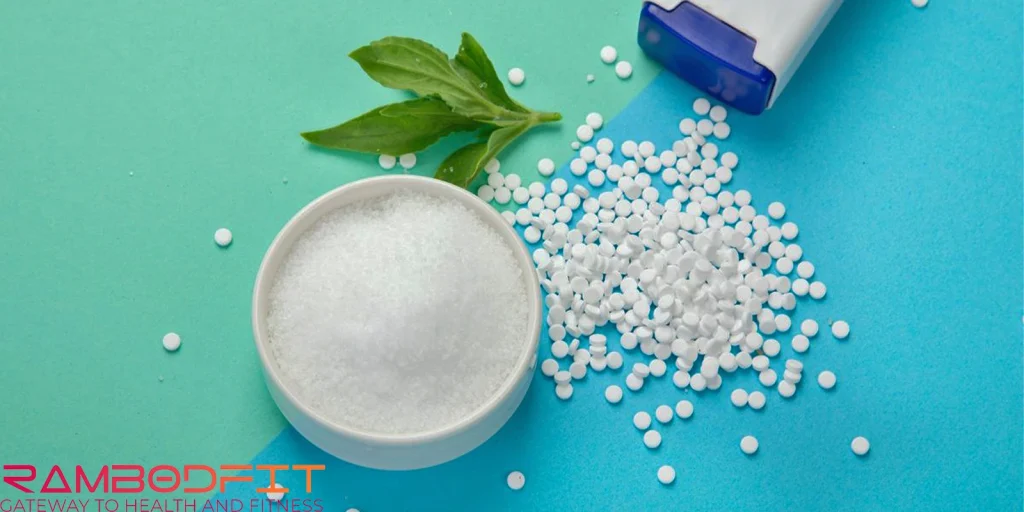


As natural bodybuilders enter the grueling final weeks of contest prep, every detail seems to matter more than ever. Counting macros has become second nature, but they must go deeper. Tracking sodium, monitoring water intake, and planning meals down to the exact minute—nothing gets overlooked.
Even a single calorie can feel like it makes a difference. In this phase, the balance between peak performance and complete burnout is razor-thin with artificial sweeteners during prep.
So when something promises sweetness without adding calories, it seems like the perfect solution with artificial sweeteners during prep.
That’s where artificial sweeteners come into play.
From diet sodas to sugar-free syrups and calorie-free gum, these products deliver the sweetness we often want when cutting calories, without costing us energy.
But do they help us get lean, sharp, and ready for competition? Or could they be messing with our progress by affecting hormones, metabolism, or gut health through artificial sweeteners during prep?
Having gone through zero-carb days and the mental grind of final prep weeks, I understand how tempting those sucralose packets or fizzy zero-cal drinks can be.
Over several rounds of prep, though, I figured out that not every sweet option is harmless, even if it has no calories, especially artificial sweeteners during prep.
At Rambodfit, let us look at this both scientifically and on a more personal level to assess artificial sweeteners during prep.

Table of Contents
Artificial sweeteners, also called non-nutritive sweeteners or NNS, copy the taste of sugar but do not add calories or raise insulin levels. Some are man-made, while others, like stevia, come from plants. They are commonly used as artificial sweeteners during prep.
Here are the most common types found in a prep coach’s list:
You’ll find these sweeteners all over contest prep culture, especially artificial sweeteners during prep.
1. Managing Calories Without Feeling Deprived
Cravings have the power to ruin even the strongest athlete’s resolve. This gets tougher during those peak prep weeks when carbs are almost nonexistent. Sometimes, just a bit of sweetness is enough to keep you on track instead of devouring an entire jar of almond butter late at night with artificial sweeteners during prep.
Using artificial sweeteners helps satisfy those sweet cravings without adding calories, which makes sticking to the plan way less stressful, especially artificial sweeteners during prep.
2. Boosting Mental Performance
Some athletes turn to sweeteners with a plan. They don’t use them to enjoy the flavor but to handle how they feel. Tasting something sweet might boost chemicals like dopamine and serotonin in the brain, benefits that matter when using artificial sweeteners during prep.
3. Often Doesn’t Trigger Insulin
Most non-nutritive sweeteners (NNS) do not cause an insulin response. This becomes important when insulin sensitivity needs strict control during contest prep. Studies support the minimal impact of artificial sweeteners during prep.

1. Effects on the Gut Microbiome
Sugar substitutes like sucralose and saccharin can mess with gut bacteria. This might interfere with hormones that signal fullness, increasing hunger. This is one of the hidden effects of artificial sweeteners during prep.
2. Cravings and Rebound Eating
When your brain expects calories after tasting sweetness but doesn’t receive any, it may push you to seek out more sugar. This issue is commonly associated with artificial sweeteners during prep.
3. Bloating and Digestive Discomfort
Sugar alcohols may cause bloating, gas, and water retention, which is problematic close to competition. Many athletes avoid these artificial sweeteners during prep.
Early Prep (8–12 Weeks Out)
Use this phase to test what your body tolerates. Pay attention to how your digestion and cravings respond to artificial sweeteners during prep.
Mid Prep (4–8 Weeks Left)
Start limiting your intake and cut out sugar alcohols. Use artificial sweeteners during prep strategically and in moderation.
Peak Week (Final 7 Days)
Time to simplify. Most coaches suggest removing artificial sweeteners during the final stretch.
Final Note Before Stage Time
Avoid sweeteners the night before the show. Your body needs real glucose—not artificial sweeteners during prep—to properly load glycogen into muscles.
Unspoken Realities: What Nobody Tells You
Artificial sweeteners can become an emotional crutch. If overused, they might disrupt hunger cues and hormonal balance, which is especially dangerous when relying on artificial sweeteners during prep.

Artificial sweeteners are tools. They’re neither miracle workers nor villains. The key is strategic use, especially of artificial sweeteners during prep.
Know what works for you. Be honest about your limits. Stay in control. And remember, success on stage doesn’t come from sweet taste—but from smart choices, including how and when you use artificial sweeteners during prep.
More to Explore and Resources
Most non-nutritive sweeteners (NNS) don’t interfere with fasting or throw off ketosis in a big way. But not everyone reacts the same. Some people might notice they feel hungrier after using sweeteners while fasting.
Stevia is a solid choice. It has the smallest effect on gut microbes and causes stomach discomfort even when used in moderate amounts.
No, you shouldn’t. The goal during carb-loading or glycogen replenishment is to absorb as much actual glucose as possible. Artificial sweeteners don’t raise insulin or refill glycogen, so they might mess with your plan instead.